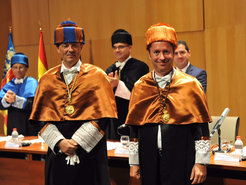Professor Ignacio Cirac receives the Honorary Doctorate from the Universitat Politècnica de València
Professor Ignacio Cirac, Director at the Max Planck Institute of Quantum Optics (Garching, near Munich) and head of the Theory Division, has received the honorary title of a “doctor honoris causa” from the Universitat Politècnica de València.
The nomination was proposed in the context of the International Campus of Excellence which comprises the Universitat Politècnica de València, the University of Valencia and the Valencian delegation of the Spanish Research Council. The award ceremony took place on Thursday, 3rd September 2015, at the Calderon Theatre in Alcoy on the occasion of the opening of the academic year. The ceremony was attended by the rector of the university, Prof. Francisco Mora, and the president of the Generalitat (regional government) of Valencia, Ximo Puig. One focus of Prof. Cirac’s work is the development of novel concepts for quantum computers. At a press conference before the inauguration the scientist pointed out: “If we have control over the microscopic world, we will be able to process enormous amounts of information in a rather inexpensive and absolutely safe way.”
The Universitat Politècnica de València is a rather young institution which is deicated to teaching and educating in engineer-type fields such as computer science, agriculture, or telecommunication. Founded in the 70ies of last century, it hosts around 38 000 students at present.
At the centre of Prof. Cirac’s research is the development of a new information theory based on the laws of quantum mechanics. New ways of controlling the world of atoms, molecules, and photons are being explored in order to exploit their quantum mechanical properties for storing and communicating quantum information with ever higher efficiency and security. These investigations are leading to new concepts for quantum computers – devices based on a system of quantum particles that serve to store and encode information. The Theory Division of Prof. Cirac has for example developed new concepts for logical elements such as quantum gates that have already been implemented by experimental physicists. Furthermore, the group develops new algorithms for quantum communication, designs new quantum networks making use of the special properties of quantum particles, and creates new theoretical tools to characterize and quantify e.g. entanglement of remote quantum systems.
Another strong focus of his theoretical research is the simulation of the behaviour of quantum many-body systems with ultracold atoms in optical lattices. For example, such systems can serve as models for solid states crystals. This work will lead to a better understanding of macroscopic phenomena such as magnetism and superconductivity, but it also aims at getting a deeper understanding about the true nature of light and matter.

During the award ceremony: Prof. Ignacio Cirac (right) and his “Padrino”, Prof. José Capmany (left).
Information on the person:
Professor Ignacio Cirac was born in the City of Manresa in 1965. He studied theoretical physics at the Universidad Complutense de Madrid where he received his PhD in 1991. He began his career in physics as a “Professor Titular” at the Universidad de Castilla-La Mancha where he stayed till 1996. In 1996 he became Professor at the department of Theoretical Physics at the University of Innsbruck. Here he continued his intense scientific collaboration with Professor Peter Zoller. Since 2001 he is Director at the Max Planck Institute of Quantum Optics and head of the Theory Division.
Professor Ignacio Cirac is a world-expert in the field of quantum information and quantum computation. In 2005 he was awarded the “Quantum Electronics Prize” of the European Science Foundation. In May 2006 he was the youngest ever winner of the renowned Royal Spanish Prince of Asturias Prize, and in the same year he received the International Quantum Communication Award together with Professor Peter Zoller. In 2009 he shared the “Frontiers of Knowledge Award in Basic Sciences” of the Spanish BBVA Foundation as well as the Benjamin Franklin Medal of the Franklin Institute in Philadelphia (USA) with Professor Peter Zoller. In January 2013 he received both the Israeli Wolf Prize and the Niels Bohr Medal. Last year Prof. Cirac received the Honorary Doctor from the University of Zaragoza, in February this year he got the Honorary Doctor from the University of Valencia. Olivia Meyer-Streng
